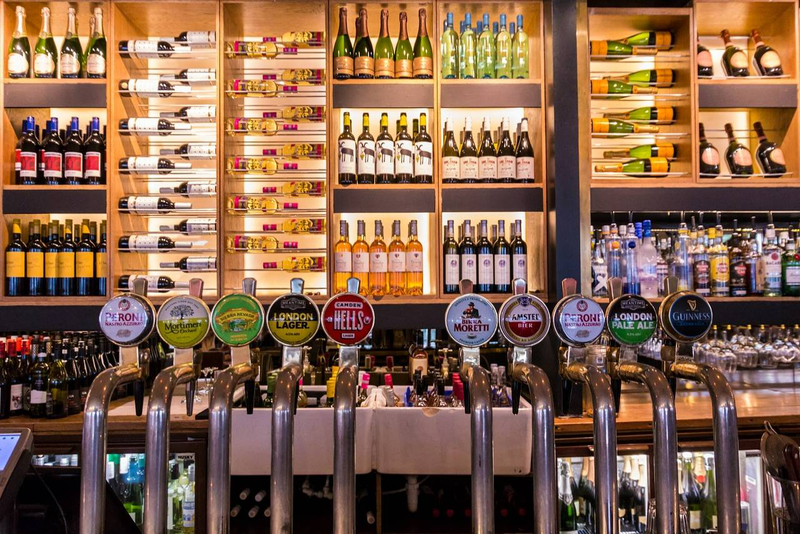What is introduction to bar management?
A bar manager or bar supervisor is the senior-most employee at a bar, under whom bartenders, servers, barbacks, and other bar staff report. Bar management involves overseeing every aspect of the barfrom purchasing, inventory control, staffing, operations, and marketing. A bar manager should be a skilled multi-tasker, capable of segueing smoothly from handling inventory to demonstrating how a drink should be made. Good management is crucial to a bar's success.
Need an Introduction to Bar Management? Here's a 5-lesson Tour
What Does Introduction to Bar Management Cover?
Running a bar is no child's play. It covers a broad range of functions and duties. A bar manager's task is to make sure every employee does their job well, and gives customers a great bar and dining experience. This requires consistency and proper employee training, which is why a bar manager is hired in the first place. From filling in at the bar during rush hour, to managing inventory, toting up the accounts at the end of the workday, to devising new menus and marketing ideasa bar manager is expected to be an all-rounder.
Every professional has to possess basic qualifications to be able to perform their job capably. A bar manager too has to have certain educational and vocational qualifications. They must have a high school degree, and preferably a diploma or degree in hospitality management with a specialization in bar and beverage management. A specialization allows them to climb the ranks faster than people who rely only on work experience.
Those who start from scratch, usually begin working at a bar as a waiter or as a bartender, and attempt to work their way up to the position of bar manager over time. Occasionally, those good at their job are coached by their bar owners or supervisors for the role, or enrolled in vocational institutes for a certificate course to gain a better understanding of the job.
Who needs an introduction to bar management?

A bar is a place where people come to unwind and have a drink after a hard day's work. They want to enjoy their drink, listen to good music, and shoot the breeze with their friends. But if people frequent a bar because they enjoy spending time there, they owe it to the bar manager . It's the bar manager's terrific management skills that make sure customers are having a good time, staying back long, and earning the bar revenue. It clearly pays to invest in a good bar manager.
Bar management is typically of interest to two kinds of people-
- People looking to work as bar managers-
- People looking to start a bar-
- According to the recruitment portal Indeed.com, the average salary for a bar manager in the U.S. is $47,000 a year. Depending on the city of work and the bar in question, this could go up to $90,000. With tips, this figures spirals up considerably.
- According to the U.S. Bureau of Labor and Statistics, the average bartender is paid around $12 per hour and $24,960 a year. A good bartender could additionally earn at least half this amount in tips.
- On average, bar employees work 60 hours a week.

Running a bar is one of the coolest jobs around. But that’s as much as you know about it.
Want to know more? Here’s an introduction to bar management that covers the basics.
Lesson 1 in Your Introduction to Bar Management- Employee Training

Training Employees and managing schedules
As a leader, bar managers schedule weekly or monthly training sessions with their employees, depending on the bar's requirements. This is the best way to improve their employees' bar skills, brainstorm for new ideas, trouble-shoot on challenges the bar faces, and bring them up to speed on new bar practices or drink recipes. Bar managers need to consistently raise the bar and empower their staff to perform better than before.
Bar managers have to master staff scheduling and roster management, keeping local labor laws in mind, while at the same time making sure the bar is adequately staffed. Working at a bar is no picnic, and to prevent burnout bar managers have to schedule shifts, making sure each employee has a good balance of working hours and time off.
A good bar manager creates work schedules well in advance, factoring planned leaves and unplanned absenteeism so that the work is not hampered. A weekly calendar helps the staff know their shift timings well in advance. The bar manager also grasps the skills and temperaments of different employees, and knows what roles and responsibilities to assign to whom. After all, a satisfied staff makes up a good work environment, and that keeps attrition rates low.
Lesson 2 in Your Introduction to Bar Management- Inventory Management

Managing inventory
A bar manager must keep a regular check on inventory and manage it well to make sure the bar is never short. Thorough knowledge of a bar's inventory necessitates thorough inventory management. That in turn entails regular and accurate stocktake, with inventory data recorded on inventory spreadsheets or on inventory software.
Paying close attention to inventory gives the bar manager a better understanding of what's selling and what's stagnating. This improves order management. The bar manager can now order more of what customers want, and less of what seldom sells. It also gives the bar manager more bargaining power with suppliers. A bar manager who understands inventory well can plug leaks in the system, catching theft and unauthorised free drinks. This helps reduce costs and lowers losses from reduced wastage.
Lesson 3 in Your Introduction to Bar Management- Learn New Skills
Keep learning
To keep up with the ever-evolving hospitality business a bar manager should be flexible and ready to learn new skills. To make their bar stand out from others, the bar manager ought to visit the competition. They should learn about new drinks in the market, pick up new marketing ideas, and know what's trending in hospitality management . A tech savvy bar manager will know how to leverage social media to draw people to the bar, by promoting its menu specials and themed events. The bar manager must be creative, and find different means of engaging existing customers and attracting new customers to the bar.
In their free time, a bar manager could pick up new tips and tricks in mixology off Youtube to coach bartenders in better service. They could also enrol in short-term certificate programs to improve their managerial skills. Alongside, picking up tricks of the trade, a bar manager should be well-versed and up to date with liquor and restaurant laws. They should make sure all the bar's licenses are valid and renewed in time, to avoid penalties.

Running a bar is not the same as running a restaurant.
What’s the difference you ask? Read this introduction to bar management to know.
Lesson 4 in Your Introduction to Bar Management- Customer Engagement

Regular interaction with customers
Greeting customers with a warm smile can make them comfortable and feel at home in a bar. Engaging with customers gives a bar manager direct insight into what they like on the menu, and what they don't. This helps the manager craft a better menu. Customer interaction also enables the manager to upsell. Customers are more likely to try out new items on a menu when recommended by the manager. At the end of their experience, the bar manager can seek customer feedback. This alerts them to what's working and what isn't at the bar.
Customer loyalty is guaranteed with special discounts on birthdays and anniversaries. Email or text messages wishing them on landmark celebrations draws customers into a tighter circle with the bar, creating a personal bond with them. However, while the bar manager aims to be friendly, they must always maintain decorum.
Lesson 5 in Your Introduction to Bar Management- Supplier Relations
Maintain business relations with liquor vendors
Liquor is the bread and butter of a bar, and a lot rides on it. The quality, range and cost of liquor is a key determinant of a bar's profits. This is why it's important to develop strong relations with the bar's liquor vendors.
Distributors cater to multiple retailers, but deals and discounts might only be reserved for a special few. A bar manager who maintains good relations with suppliers will cash in on these. They also stand to benefit from better margins on the purchase price.
There are times vendors require a place to conduct a product launch of a new brand. Or they're looking to pass around free drinks for a market survey. Because the vendor has cordial relations with a bar manager, their bar will top their priority list to host such events. A bar that host gigs and events regularly also gets featured in food magazines. This translates into free advertising and rave reviews. And all this on account of a job well done by the bar manager.

You're a bartender who's been asked to run a bar. But you've never had formal training and don't know where to start.
Read our introduction to bar management and you’ll be ready to dive right in.



































